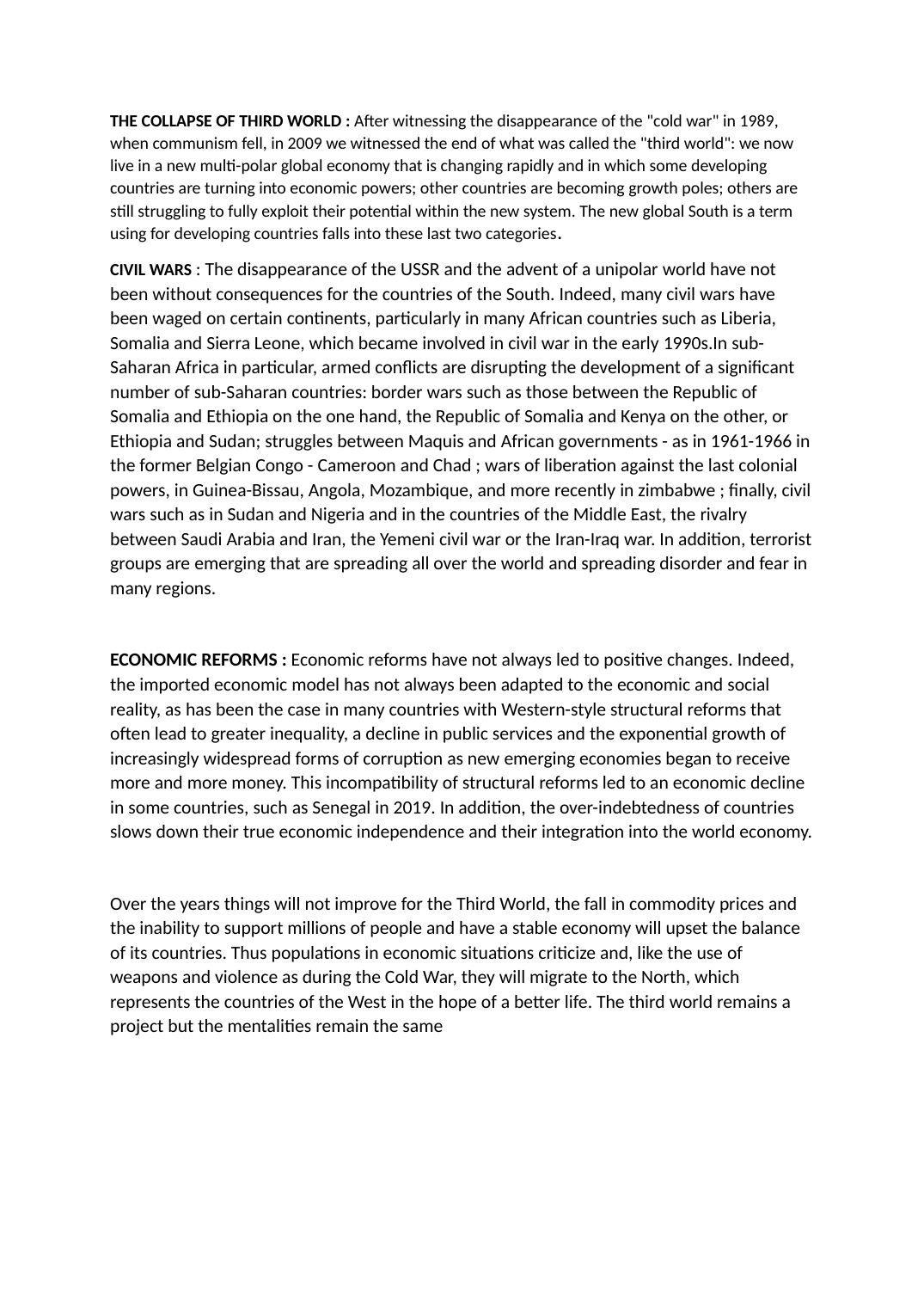Un nouveau sud
Publié le 23/05/2020
Extrait du document
«
THE COLLAPSE OF THIRD WORLD : After witnessing the disappearance of the "cold war" in 1989,
when communism fell, in 2009 we witnessed the end of what was called the "third world": we now
live in a new multi-polar global economy that is changing rapidly and in which some developing
countries are turning into economic powers; other countries are becoming growth poles; others are
still struggling to fully exploit their potential within the new system.
The new global South is a term
using for developing countries falls into these last two categories .
CIVIL WARS : The disappearance of the USSR and the advent of a unipolar world have not
been without consequences for the countries of the South.
Indeed, many civil wars have
been waged on certain continents, particularly in many African countries such as Liberia,
Somalia and Sierra Leone, which became involved in civil war in the early 1990s.In sub-
Saharan Africa in particular, armed conflicts are disrupting the development of a significant
number of sub-Saharan countries: border wars such as those between the Republic of
Somalia and Ethiopia on the one hand, the Republic of Somalia and Kenya on the other, or
Ethiopia and Sudan; struggles between Maquis and African governments - as in 1961-1966 in
the former Belgian Congo - Cameroon and Chad ; wars of liberation against the last colonial
powers, in Guinea-Bissau, Angola, Mozambique, and more recently in zimbabwe ; finally, civil
wars such as in Sudan and Nigeria and in the countries of the Middle East, the rivalry
between Saudi Arabia and Iran, the Yemeni civil war or the Iran-Iraq war.
In addition, terrorist
groups are emerging that are spreading all over the world and spreading disorder and fear in
many regions.
ECONOMIC REFORMS : Economic reforms have not always led to positive changes.
Indeed,
the imported economic model has not always been adapted to the economic and social
reality, as has been the case in many countries with Western-style structural reforms that
often lead to greater inequality, a decline in public services and the exponential growth of
increasingly widespread forms of corruption as new emerging economies began to receive
more and more money.
This incompatibility of structural reforms led to an economic decline
in some countries, such as Senegal in 2019.
In addition, the over-indebtedness of countries
slows down their true economic independence and their integration into the world economy.
Over the years things will not improve for the Third World, the fall in commodity prices and
the inability to support millions of people and have a stable economy will upset the balance
of its countries.
Thus populations in economic situations criticize and, like the use of
weapons and violence as during the Cold War, they will migrate to the North, which
represents the countries of the West in the hope of a better life.
The third world remains a
project but the mentalities remain the same.
»
↓↓↓ APERÇU DU DOCUMENT ↓↓↓
Liens utiles
- L’Asie du Sud-Est : Montrez en quoi les inégalités d’intégration et la mondialisation entraînent des politiques complexes de coopération.
- Sud-Africain
- Afrique du Sud
- Actes Sud.
- Chicoutimi 1 PRÉSENTATION Chicoutimi, ville du Canada, chef-lieu de comté de Chicoutimi, dans le sud du Québec, située au confluent des rivières Chicoutimi et Saguenay.

































